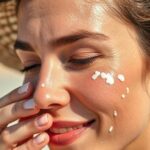A staple of Mediterranean diets for centuries, olive oil, or liquid gold, finds application far beyond the kitchen as a skin boon, thanks to its rich combination of antioxidants, vitamins, and healthy fats.
The first in the list of the miraculous skin benefits of olive oil to be considered here is the top 10 reviewed through scientific literature or expert opinion.
1. Deep Moisturization
Olive oil is famous for its moisturizing property. It contains squalene and vitamin E, both of which greatly help in retaining moisture in the skin.
Squalene closely resembles natural oils of the skin, therefore making it a very good emollient that penetrates deeply yet does not leave a greasy feel. Vitamin E, a strong antioxidant, supports moisture retention by the skin and thus gives it a soft and supple appearance.
2. Rich in Antioxidants
Olive oil is full of antioxidants, from polyphenols to vitamin E and phytosterols. The antioxidants help in reversing the oxidative stress initiated by the free radicals responsible for causing premature aging and damaging the skin.
By combating free radicals, olive oil protects the skin from environmental threats such as pollution and UV radiation.
3. Anti-Aging Properties
Not only does olive oil protect skin cells from damage, but it also helps keep skin smooth and youthful in appearance. Continuous application of olive oil will diminish the appearance of fine lines and wrinkles as a result of elastic skin and strengthened collagen production.
4. Natural Makeup Remover
Olive oil is an effective makeup remover, and it can remove even the most stubborn waterproof products. It contains a ratio of lipids that breaks down the makeup particles, therefore allowing a very effortless removal without stripping the skin of its natural moisture. Just take a few drops of olive oil on a cotton pad and wipe it on the skin; then rinse it with warm water.
5. Soothes Inflammation and Irritation
Both the anti-inflammatory properties of olive oil work on skin irritations and redness. As oleocanthal and oleuropein are compounds that reduce inflammation, one can indeed say that olive oil is good for the treatment of eczema and psoriasis. It also gives some relief from sunburn and other very small skin irritations.
6. Improves Skin Barrier Function
The fatty acids in olive oil, oleic acid in particular, are thought to strengthen the skin’s natural barrier. The skin barrier must be robust to avoid moisture loss and exposure to environmental pollutants. Olive oil helps reinforce some of that barrier to maintain skin integrity and resilience.
7. Aids Wound Healing
Research has shown that olive oil can speed up the healing of wounds. Anti-inflammatory and antimicrobial properties help to limit the chances of infection and improve tissue regeneration. Application of the olive oil on small cuts and scrapes will facilitate quicker healing and a reduced risk of scarring.
8. Enhances Skin Tone and Texture
Using olive oil regularly can create smoother skin and help create a more even complexion. The hydrating and nourishing properties of olive oil can help improve the appearance of hyperpigmentation and uneven patches in skin texture.
The gentle exfoliating effects of olive oil can also remove dry, dead skin cells, revealing beautifully bright skin underneath.
9. Reduces Signs of Aging
The antioxidant and healthy fats found in olive oil will help prevent the premature aging of skin. Antioxidants protect against some of the damage caused by and decrease oxidative stress on the skin, while healthy fats hold moisture in the skin and prevent signs of anti-aging, such as sagging and dullness. Certainly, fatty acids do not prevent aging altogether (as everyone ages), but olive oil can help mitigate signs of aging by addressing oxidative stress.
10. Good For Sensitive Skin
Most people tolerate olive oil well; so skin that hurts, itches, stings, or becomes red from another product can tolerate and use olive oil. The gentle and natural composition of olive oil makes it a great choice for anyone suffering from an allergic reaction or irritation from any chemical. However, it is important to incorporate any new product by patch testing to see if you will have a reaction.
How to Incorporate Olive Oil into Your Skincare Routine
1. Use it as a moisturizer: Smooth a few drops of extra virgin olive oil on freshly washed skin before applying any other cream or liquid for maximum absorption of fresh moisture.
2. Makeup Remover: Use olive oil on the cotton pad for removing makeup and rinse with water after for a beautiful glow.
3. Face Mask: Mix olive oil with honey or yogurt to prepare a nice face mask.
4. Exfoliant: Mix olive oil with sugar or sea salt to a fine consistency to form an exfoliating natural scrub.
5. Lip Balm: A few drops of olive oil on chapped lips will keep them moist.
How to Choose Olive Oil for the Skin
To reap the health benefits on your skin, it would be best to pick a high-quality extra virgin olive oil (EVOO). This is the least processed form of olive oil and retains maximum amounts of its highly beneficial antioxidants and nutrients. They should be cold-pressed and organic to know they are unadulterated and efficient.
Precautions and Considerations
Here are considerations while most people can benefit from olive oil: Most people will benefit from olive oil; however, there are exceptions.
Comedogenicity: Moderate comedogenic rating- prohibits pore clogs in some individuals, miserable for acne.
Allergy reactions: A patch test is very important before extensive use of this oil form application to know if there is a reaction on the skin.
Storage: The storage of olive oil should be in a cool, dark place to avoid oxidation and the loss of its benefits.
There are loads of benefits of using olive oil in your skincare routine, such as deep hydration, anti-aging effects, improved skin tone, and improved skin barrier function. With its natural and versatile makeup, it is a very easy and convenient substance for skin enhancement.
As always, before using anything new on your skin, consider your skin type and do a patch test to check if it is compatible with the product. One secret in the book of beauty-aid passed down through generations, olive oil can open up all possibilities for the promise of rich, healthy skin.
Frequently Asked Questions (FAQs)
1. Can I use olive oil on my face every day?
Yes you can apply olive oil every day on your face. If your skin is dry or normal, it’s completely fine. But for oily and acne-prone skin, you can apply it on a very small area and observe its effect.
2. What is the best type of olive oil for skin?
The best quality of oil for skin care is extra virgin olive oil (EVOO). This type is unrefined and cold-pressed and, hence, retains the maximum amount of antioxidants and nutrients for your skin.
3. Can olive oil clog pores?
Yes, olive oil has a moderate comedogenic rating and may clog pores in some individuals, especially when that person already has an oily skin type and suffers with acne. Always do a patch test first and use in moderation.
4. Is olive oil better than coconut oil for skin?
It is a problem of skin type. People who are dry or have aging skin may fare better with olive oil, which is more antioxidant-rich, while coconut oil is an angel in hydration but much more comedogenic and less safe for anyone with acne-prone skin.
5. Is It Safe to Sleep with Olive Oil on the Face?
A thin layer of olive oil can be applied overnight for an intense application of moisture and skin-healthy conditions. As always, skin should be clean before the application to prevent trapping dirt or bacteria.
6. Does olive oil help with wrinkles?
Yes, and olive oil contains antioxidants such as vitamin E and polyphenols that fight against free radicals and may also hinder the formation of fine lines and wrinkles in the skin over time.
7. Will olive oil get rid of dark spots?
Olive oil can improve the whole skin complexion, as well as dark spots, with constant application, but it cannot be compared with vitamin C or niacinamide applications.
8. Is olive oil safe for sensitive skin?
In general, yes. Olive oil is gentle and very compatible with most skin types. However, patch testing should be done for people with sensitive skin before they apply it widely.
9. Can olive oil act as sunscreen?
No, olive oil is certainly not sufficient to provide adequate protection from UV rays; therefore, it cannot be used in place of sunscreen. Always use a broad-spectrum SPF whenever under the sun.
10. How long does it take for results to show using olive oil on your skin?
Results might differ according to the user and skin problem; for some people, hydration and softness can be seen after a few days, while aging and pigmentation might take weeks of regular application before noticing changes.
















